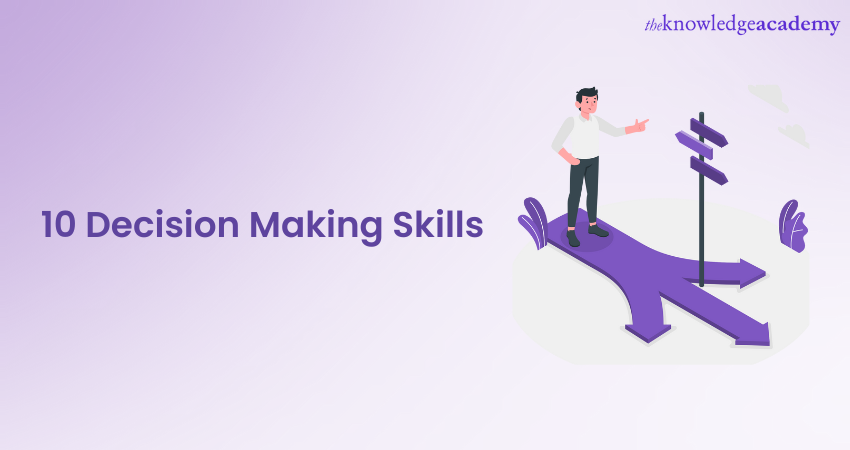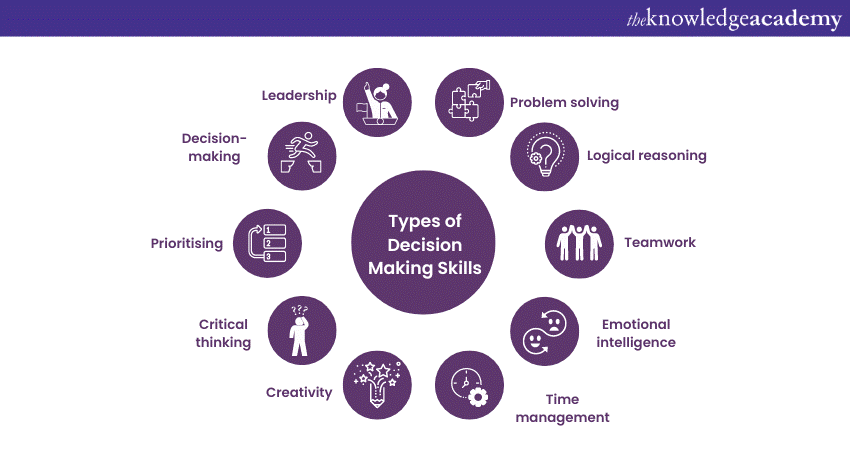We may not have the course you’re looking for. If you enquire or give us a call on 01344203999 and speak to our training experts, we may still be able to help with your training requirements.
Training Outcomes Within Your Budget!
We ensure quality, budget-alignment, and timely delivery by our expert instructors.

In a world brimming with options and opportunities, the ability to make effective Decisions is a skill that holds paramount importance. From the simplest choices of our daily lives to complex professional and personal crossroads, our DecisionMaking Skills shape the trajectory of our journey.
Decision Making Skills are something everyone requires in their professional lives. They an integral part of modern-day management of any organisation or business activities. Therefore, it’s crucial to gain these skills.
Want to know more about what these skills are and why are they important? In this blog you will learn how acquiring Decision-Making Skills may make a difference in your ability to make better Decisions that enhances your organisation. Read ahead to know more!
Table of Contents
1) What are Decision Making Skills?
2) Types of Decision-Making Skills
a) Problem solving
b) Logical reasoning
c) Teamwork
d) Emotional intelligence
e) Time management
f) Creativity
g) Critical thinking
h) Prioritising
i) Courage to take the decision
j) Leadership
3) How to improve Decision Making Skills?
4) Conclusion
What are Decision Making Skills?
Decision-Making Skills means knowing how to make the most effective Decisions. Learning the ropes of good Decision-making skills in the workplace includes bonding with employees, establish better teamwork, apply logical thinking etc. among others.
Moreover, Decision-Making Skills show the ability of a person to select the best possible option from the given alternatives. In professional fields, excellent Decision-making skills contribute directly to the company's growth. For individual growth as well, it is one of the most sought-after skills.

Types of Decision-Making Skills
Not every individual is equipped with all types of skills. These abilities can differ across Decision Makers. Let us discuss them in detail:
Problem solving
An integral component of decision-making is problem solving skill. Good Decision Makers are expected to solve critical problems in an effective way. Problem solving constitutes having different viewpoints for considering the numerous variables and needed to make the best decision. It is important in decision-making process to separate emotions that can influence the decision negatively. The essence of a good problem-solving skills is to formulate Decisions very quickly and effectively. An in-depth research and close attention to all the details of the problem is needed for this.
Logical reasoning
When it comes to decision-making skills, it’s necessary to review all pros and cons of the decision before taking any action on it. This skill is called reasoning. It is always suggested to reason with the present and the plan for the future while going through decision-making process. All available and relevant facts and data should be considered. So, the main motive of reasoning is to break down the options.
Sometimes people use their intuition power also before taking a decision. Intuition is basically reaching a decision based on one’s instincts. These instincts are both - inborn and acquired from the experiences as well. Decisions made in the past help people get an idea of even new problems. These experiences and the lessons learned factor into Decision Making Skills. These instincts need to be associated with the potential actions in course of decision making.
Teamwork
It is vital for team leaders to engage their employees while making business decisions. Employees can convey their criticism on their ideas or devise new ideas that will enhance the their decision-making skills. Consider an example of a marketing team led by a team leader, where they can exchange ideas amongst each other on boosting their sales revenue. They can also collaboratively work with other employees in the decision-making process to convince them to buy into their decisions.
Emotional Intelligence
Emotional intelligence is another key facet of Decision-making skills. It makes people aware of their emotions, and the ability to put it in a way that encourages action. Emotions lay the groundwork for inspiration regarding a any action to be taken. The way you analyse problems is going to determine how well-informed you are when making the final decision.
Time management
Only taking the right decision is not enough sometimes. It must be taken in the due course of time. After that it can lose its relevance. That's exactly where time management comes in the picture. There are some Decisions that need to be made quickly. The Decision Maker has to outline the time-frame that would be required to make the decision and then set his/her priorities accordingly. It’s because sometimes you have to work with limited resources. Time management allows you to structure your plans so that the best possible decision can be taken.
Creativity
Creative minds can certainly improve in theirDecision-making skills. Creativity should be used to get full benefits of logical and emotional thinking and to reach a unique solution. Creativity is also a skill that can be acquired. Exchanging ideas with each other can enhance this skill to come up with short and long-term solutions. You can use your interactions that you have with other people to enhance your creativity. But for this, it’s necessary that everyone’s voice is heard. This is why regular meetings, brainstorming sessions and conversations are suggested to maximise the level of creativity.
Critical thinking
Critical thinking skills are as essential for decision-making as logical thinking. Critical thinking allows Decision Makers to focus on the dark side of the decision also. It ensures that the Decisions provide desirable results and minimise the risk of failure. Critical thinking skills require a lot of research and reflection on past scenarios to solve similar challenges.
Prioritising
Identifying what needs to be done on priority is of utmost importance in decision-making. It means making choices, approving important things and also saying ‘no’ to the less important ones. The last point is something most people find difficult to deal with. But Decision-making Skills teaches you where to draw the line.
Courage to take the Decision
Last but not the least, it takes courage to make good Decisions, and more importantly, to take full accountability of that Decision. Another aspect of looking at this can be to know when a popular choice is not necessarily the best one. Decision Makers don’t go with the most popular options, but with the most suitable one. And it takes courage. It also gives the scope of correction.
Leadership
It is the team leader’s responsibility to mobilise their employees so they can rally behind the business decisions that they make for achieving the project goals. It is vital for them to foster a solid relationship with their employees so they feel free and open to engage in conversation with them. This enables their employees to offer insights that can aid in their decision-making process. A team leader who is approachable by their employees improves their relationships for the betterment of the company.

Leadership, Problem solving, Logical Reasoning, Teamwork, Emotional Intelligence, Time Management, Creativity, Critical Thinking, Prioritising, Courage to take the Decision
How to improve Decision Making Skills?
Here are some tips on how to improve Decision Making Skills :
a) Identify the situation: You cannot improve at decision-making unless you understand the scenario really well. So, the first thing you need to do is to gain an empathetic understanding of the problem that is to be solved. Accumulate all related information and then only start making Decisions. Deeper understanding of the problem enables you to find alternative ways to solve a problem. Identifying the situation correctly leads to innovative solutions.
b) Mapping of potential solutions or actions: After identifying the situation, documenting all the possible solutions is another good idea. Listing the possible actions helps you understand which one of them are feasible and which one are not. It's better if it’s done in front of your team. It will allow them to actively participate in the process of decision making and find the most suitable solution.
c) Listing the pros and cons of each possible solution: It’s very important to discuss the pros and cons of all possible solutions before implementing them. It helps you know if it matches your goals or not. Thinking about the Decisions as short and long-term impact is also crucial.
d) Overcome biasing: It’s very important that good Decision-Making skills should not reflect any kind of biasing. Good Decision Makers are those who overcome biasedness because it might affect their choice and also the consequences.
e) Avoid procrastination: Some Decisions need to be made at the right time. When delayed, they may lose their relevance or can cause damage also. So, to master the skills of decision-making, stop procrastinating!
Conclusion
A decision can be defined as a course of action, opted from a set of alternatives. Good Decision Making Skills are considered as the primary function of management today. Managers take a number of Decisions that has long lasting effects on their organisation. So, it’s very important to understand and upgrade these decision-making skills for professional growth. These are essential to sustain the activities of all businesses and organisational functioning.
Take charge of your professional growth with our Leadership Skills Training!
Frequently Asked Questions

A carefully planned process of decision-making can positively influence the journey of their careers. Additionally, their ability to make better informed choices helps guide and empower them in their decision-making skills. Moreover, possessing the necessary clarity and direction gives them the clear vision of their destination. They can also work on maximising their opportunities, such as transitioning into entrepreneurship or further education. Furthermore, adaptability and resilience will help them adapt to unexpected changes in their career plans.

Decision-making skills will be valuable to any employee at a workplace. They can transform into more productive employees by making better informed decisions, as it can save them time and enable them to leverage their decisions better with optimised utilisation of resources. Some of the key strategies that employees can utilise to improve their abilities to make business choices are analytical thinking, critical thinking, investigation, active listening and more!

The other Leadership courses provided by The Knowledge Academy include a wide range of options such as Leadership Skills Training, Agile Leadership Training, Business Administration Masterclass, Decision Making Training and more! There are also courses that cover other skillsets under Leadership such as Design Thinking Course, Delegation Training, Business Development Training and Managing Innovation.

The Knowledge Academy takes global learning to new heights, offering over 30,000 online courses across 490+ locations in 220 countries. This expansive reach ensures accessibility and convenience for learners worldwide.
Alongside our diverse Online Course Catalogue, encompassing 17 major categories, we go the extra mile by providing a plethora of free educational Online Resources like News updates, blogs, videos, webinars, and interview questions. Tailoring learning experiences further, professionals can maximise value with customisable Course Bundles of TKA.
The Knowledge Academy’s Knowledge Pass, a prepaid voucher, adds another layer of flexibility, allowing course bookings over a 12-month period. Join us on a journey where education knows no bounds.
Upcoming Business Skills Resources Batches & Dates
Date
 Successful People Management and Team Leadership
Successful People Management and Team Leadership
Fri 7th Jun 2024
Fri 2nd Aug 2024
Fri 4th Oct 2024
Fri 6th Dec 2024







 Top Rated Course
Top Rated Course


 If you wish to make any changes to your course, please
If you wish to make any changes to your course, please


